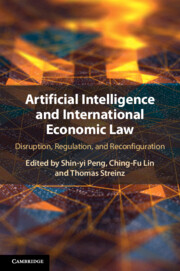Artificial Intelligence and International Economic Law
Artificial intelligence (AI) technologies are transforming economies, societies, and geopolitics. Enabled by the exponential increase of data that is collected, transmitted, and processed transnationally, these changes have important implications for international economic law (IEL). This volume examines the dynamic interplay between AI and IEL by addressing an array of critical new questions, including: How to conceptualize, categorize, and analyze AI for purposes of IEL? How is AI affecting established concepts and rubrics of IEL? Is there a need to reconfigure IEL, and if so, how? Contributors also respond to other cross-cutting issues, including digital inequality, data protection, algorithms and ethics, the regulation of AI-use cases (autonomous vehicles), and systemic shifts in e-commerce (digital trade) and industrial production (fourth industrial revolution).
Shin-yi Peng is Distinguished Professor of Law at National Tsing Hua University. She specializes in international trade law, with a focus on trade in services, digital trade and increasingly data governance. She is a former Commissioner of the National Communications Commission of Taiwan and has served as Vice President of the Society of International Economic Law. Professor Peng is also a member of the Indicative List of Panelists for resolving WTO disputes. She tweets @pengshinyi.
Ching-Fu Lin is Associate Professor at National Tsing Hua University, where he teaches artificial intelligence law and policy, international law and global governance, and law and technology. He tweets @ChingFuLin.
Thomas Streinz is Adjunct Professor of Law and Executive Director, Guarini Global Law & Tech at New York University School of Law. He co-convenes the Guarini Colloquium: Regulating Global Digital Corporations and co-teaches a course on Global Data Law. His research encompasses global digital governance, global law and technology, and the regulation of the global data economy. He tweets @t_streinz.
This title is also available as Open Access on Cambridge Core with funding support by the Erasmus+ Programme of the European Union.

